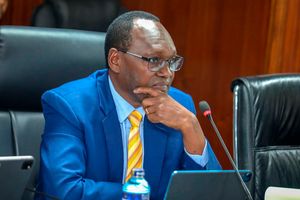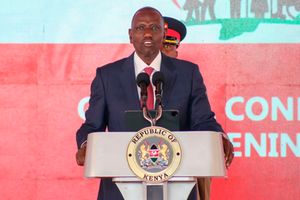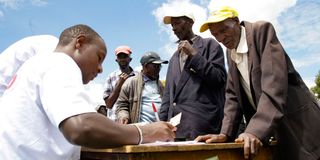
The elderly and vulnerable wait to open bank accounts for the Inua Jamii programme at the Elburgon Assistant County Commissioner's office in Nakuru County on May 24, 2024.
For seven years, 85-year-old Elburgon resident Rosemary Nyambura Mwaura was locked out of the Inua Jamii programme, as records mistakenly indicated that she was dead.
About 230 kilometres away in Kapenguria, 71-year-old Jackson Makona was suffering a similar fate, but for two years.
And in Murang’a town, dozens of frail elders last week sat helplessly outside a local Safaricom retail outlet after being told they could not register for a mobile phone SIM card because their national identity numbers have seven digits.
The same problem applies to those with SIM cards because local mobile money agents cannot register them given the ID number hitch.
Yet, without a mobile phone line, or registration into the system for those with SIM cards, they cannot receive the monthly government stipend following President William Ruto’s directive that all disbursements be done through mobile money wallets.
Through the Inua Jamii programme, the government gives a Sh2,000 monthly stipend to poor citizens above 70 years, orphans and disabled Kenyans unable to fend for themselves.
Ms Esther Wanjiku wept as she narrated how she has been carrying her 96-year-old mother Josephine Njeri on her back from the village to seek help in town.
Health problems
“The place is so hilly and due to her old age and health problems, she could not walk. I had to carry her on my back only to be told she can’t have a SIM card due to the ID," Ms Wanjiku said.
Ms Wanjiru Chege whose grandmother’s ID indicates she was born in 1916 is equally bitter.
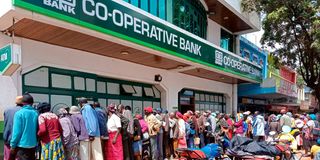
The elderly queue at the Co-operative Bank in Kitale town to get their stipend from the government.
“Even after travelling for over 30 kilometres, I was told that her ID number was rejected by the system as it is too old,” she recounted the plight of her grandmother Jennifer Macharia.” They said those with such numbers are no longer alive. Why are they saying my grandmother should be dead? Are they wishing that she was dead?” Ms Chege asked in tears.
Mr David Mugo, 86, who is from Mukangu village in Kiharu constituency, said he had spent the whole day in Murang’a town without food trying to get his SIM card registered without success.
“I have been receiving the monthly stipend so when I went to the chief, he informed me about the registration. I only had Sh400 and thought the process would not take long. But here I am, hungry and I have not succeeded yet,” Mr Mugo said. “I had hoped to get some money after registration but my SIM card was rejected,” he added.
“Our system is not configured to register them (those with a seven-digit ID number),” explained an agent at the mobile money outlet insisting they had to seek help at the main customer care centre.
At the Coast, beneficiaries are also facing similar challenges to receive cash under the new mobile payment system.
Some said they had lost their cards, while in other cases, their children and grandchildren had used their national identification cards to register multiple lines and therefore they could not register new lines.
"I received my last disbursement of Sh2,000 via the bank’s ATM in December 2024. I was informed the other transactions would be done through M-Pesa and our numbers were even taken. It is now the second month of 2025 and we haven't received any funds yet,” said Mr Doza Diza, 74, from Lamu West.
Both Ms Nyambura and Mr Makona finally managed to update their records, which cleared the path for monthly payments from the State Department of Social Protection and Senior Citizen Affairs.
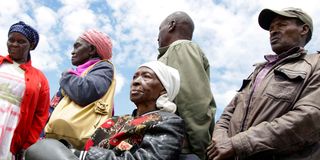
The elderly and vulnerable, wait to open bank accounts for the Inua Jamii programme in Elburgon, Nakuru County on May 24, 2023.
Ms Nyambura started receiving funds under the programme in 2024, but fears being excluded from the programme, following a President William Ruto-backed directive that all disbursements be done through mobile money wallets.
The move may have sounded noble, as it saved more than a million elderly people expensive and tiring trips to withdraw their monthly Sh2,000 stipend, but risks locking out some of the poor senior citizens it is intended to help.
Some do not have mobile phones, others are illiterate and a few have fallen prey to wayward relatives entrusted with their mobile money wallet PIN numbers.
“I can’t read or see well. Using a phone for transactions is risky, and I can’t trust anyone with my PIN,” Ms Nyambura said in an interview.
Ms Nyambura fears that many beneficiaries may fall victim to fraud if they mistakenly share their PINs. She also finds it difficult to know when the money has been deposited.
“With the old system, the money was sent to one account, but now, I don’t know if it’s my stipend or just money from friends or relatives. The system sometimes fails, making it even harder to access the funds,” she said.
On Friday, the State Department of Social Protection and Senior Citizen Affairs, which runs the Inua Jamii programme, disbursed funds for the elderly which is intended to give a boost until the end of February, Principal Secretary John Motari told the Nation in a phone interview.
Mr Motari said the decision to dump banks and move to mobile money wallets was advised by President Ruto in a past discussion, and aimed at easing access to funds for the elderly and reducing fraud which has dogged the Inua Jamii programme for years.
Mr Motari admitted that there may be a few bumps in the initial stage, but maintained that the beneficiaries only need to acquire a mobile money-enabled SIM card from any telco, and not necessarily own a phone.
“His Excellency (President Ruto) advised me to just send this money to (the elderly) people’s M-Pesa. When we start there will be a few hiccups, but as we develop it, I assure you no money will be lost. You don’t have to own a mobile phone, just a SIM card, it’s just Sh50. Go to an M-Pesa agent, and you will get your money,” Mr Motari said.
The Inua Jamii has in the past had incidents of fraud, where some unscrupulous individuals used the registration details of beneficiaries to receive funds, at the expense of several senior citizens, orphans and disabled individuals.
Mr Motari says that the use of mobile money wallets will end such fraud.
For the two years that Mr Makona was wrongfully listed as deceased in the State Department for Social Protection’s records, money was still being disbursed to bank accounts not registered or operated by him – the fraud scheme that the government intends to stop through mobile money disbursements.
After sorting out the wrongful listing as deceased, the money would be channelled to Mr Makona’s account.
But his caregiver took advantage of the fact that Mr Makona does not own a mobile phone, and is semi-literate, to scheme from the senior citizen, who has been disabled since a road accident 30 years ago.
Tokou Sub-Location Assistant Chief Philomena Karotoi told the Nation that many old people in the Sigor area and Pokot Central Sub-County are suffering after the mode of payment was changed.
“The elders live in abject poverty, and they lack phones to receive the stipends,” she said.
Ms Karotoi said many of them have been asked to go to the Safaricom Customer Care in Kapenguria to acquire phones and register lines.
“Yet the elders have no transport to Kapenguria more than 100 kilometres away," she said.
Ms Karotoi added that most beneficiaries in her jurisdiction have opted to use mobile phones of their relatives or caretakers, some of whom cannot be trusted.
“Many don’t trust their children or grandchildren who steal their money. They have no way forward and they prefer the old Inua Jamii cards process through which they used to get the money,” she said.
A spot check by Nation in Elburgon, Nakuru County revealed that while some beneficiaries own phones, they can only make and receive calls and cannot navigate M-Pesa transactions.
Others lack SIM cards altogether.
Daniel Mosonik, 86, from Mariashoni in Molo has depended on the cash transfer for the past five years.
He says the shift to M-Pesa is making it difficult for elderly beneficiaries to access their stipends.
“I have never missed my stipend, and it is my lifeline since I live alone. This new system is a big challenge because I don’t know how to operate my phone beyond answering calls,” he told Nation.Africa.
Previously, he would walk several kilometres to access bank agents but now he fears being locked out of the programme.
He said he now has a temporary phone and has asked that the money come through him or his wife.
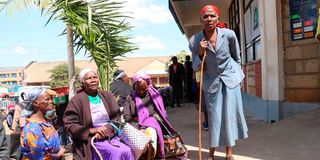
Elderly people wait for their monthly stipends outside Kenya Commercial Bank, Meru town on July 1, 2019.
But the PS, Mr Motari, said that no money will be lost and those who miss out on a month’s disbursements will get double in the next cycle.
“If you miss (the stipend) this month, next month you will get Sh4,000. We want to be sure of who is getting money. With M-Pesa, we will be doing proof of life (checks),” Mr Motari added.
Chepakoe Rimang’ole, 93, Cheporee Chelimo Lokwakit, 75, Lonyanyat Kimoi Lokadang’ole, 91, and Chelekee Cheplekekal, 60, all from Weiwei, Sigor Sub County.
The four used to access the cash transfer funds through Equity and Kenya Commercial banks, but now they are unable to access the funds because they have no phones.
In Turkana County, Kiyapa Abolem, 86, who is disabled does not have a mobile phone and has never owned one, hence cannot access the cash transfer funds for the elderly.
He relies on the sheer strength of his hands to move from place to place begging for food while navigating life with remarkable determination.
But life could be easier for Mr Abolem if he is assisted to get a mobile phone and register for the cash transfer. But at the moment, begging and relief food support from Pure Gift organization are all he has.
"I am abandoned and neglected. I need help to get the necessary aid through the cash transfer program. A wheelchair too would transform my daily struggles into a chance to move freely and regain my independence," he said at his Lokipetot village home in Loima Sub County.
He said many elderly people in remote areas are abandoned and neglected.
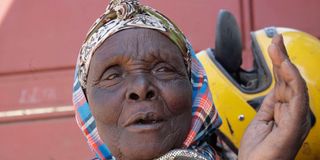
Ms Ann Chebet, 84, a resident of Mariashoni in Molo, Nakuru County during the interview on 19 February 19, 2025. Ms Chebet says she had to renew her line after losing her phone a few months ago to receive the monthly stipend under the new Mpesa payment system.
Ann Chebet, an 84-year-old from Mariashoni area lost her Safaricom SIM card months ago and could not receive her stipend. The new system forced her to re-register and get a new line.
“I now rely on my son to help me withdraw money since I don’t understand M-Pesa transactions. But I can’t trust just anyone with my phone or PIN,” she told Nation.Africa.
Ms Chebet last received her stipend in December 2023 and has since depended on her son for financial support.
The granny warned that many elderly people could be locked out due to lack of phones, adding that the previous system, which used fingerprints at bank agents, was simpler and more reliable.
"We have been turned away from local banks because the government has delayed in releasing our cash," said Mr Julius Makau, 80, from Kirinyaga.
“We are now in February and we have not been given money for January," said Mr Makau. And Mzee Gakono Njakori, 93, also lamented he was tired of waiting for the money.
Reporting by John Njoroge, Oscar Kakai, Sammy Lutta, Florah Koech, Martin Mwaura, George Munene, Kalume Kazungu and Maureen Ongala



